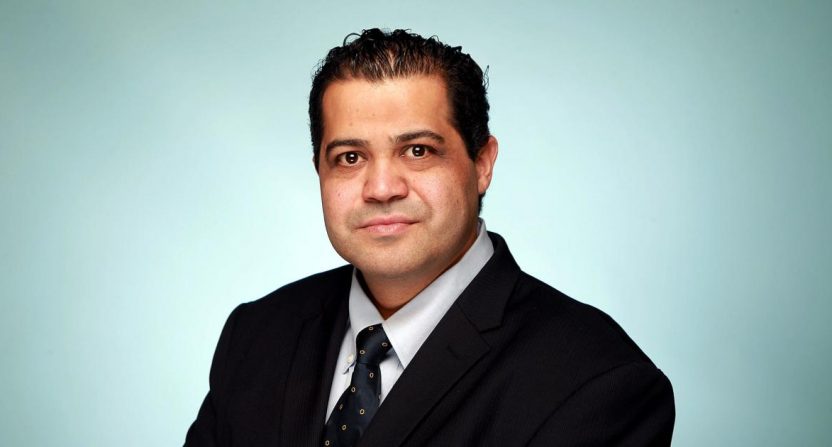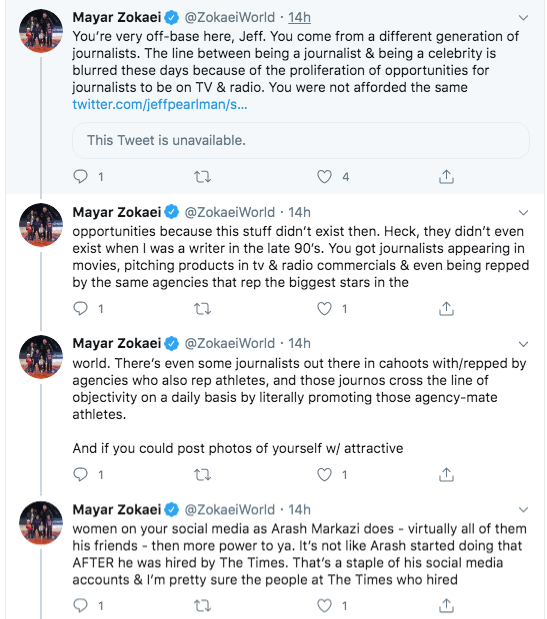Ask around and there are two very different narratives regarding Los Angeles Times sports columnist Arash Markazi, who earlier this week was placed on paid leave. Depending on who you talk to, one of these two things happened:
1- Markazi’s colleagues rallied together to voice their ongoing concerns to management regarding Markazi’s work and lack of basic journalistic principles. Those concerns first surfaced publicly in a wide-ranging feature from Vice earlier this month, with a follow-up piece specific to Markazi published Thursday.
Way to go members of the @latimessports staff for taking a stand. Things are tough enough for journalists. Don't need wannabes lacking ethics damaging the profession. @latimes #ethicsmatter https://t.co/UVLpngx559
— chris foster (@cfosterworld) July 16, 2020
2- Markazi was targeted by a faction within the sports department who was never comfortable with his hiring and actively rooted for his demise, patiently circling for an opportunity to force the issue.
What goes without saying is that both of these narratives are not mutually exclusive. More importantly, exactly how this started may be irrelevant given how public and vocal the staff’s discomfort about Markazi has become.
Markazi joined the Times in January 2019 after previous stints with ESPN and Sports Illustrated. He described the move to the Times as a dream job. But multiple sources told Awful Announcing that there was a very tepid internal response to Markazi’s hiring. Long-time stalwarts at the paper, who had undergone multiple unstable ownership tenures, largely felt that hiring Markazi was a step in the wrong direction in terms of rebuilding the editorial reputation and authority the Times had once held. With the paper finally in a more stable ownership position and actively hiring talent for the first time in quite a while, Markazi’s hiring rankled many who had seen numerous talented colleagues let go over the years.
To those involved in Markazi’s hiring, it was a no-brainer. The Times was looking to diversify its newsroom, and Markazi was a very well-known and well-liked local talent who had experience at larger national outlets. Particularly attractive, Markazi had (and continues to have) a very large and active social media following across multiple platforms, with a lot of his social content highlighting his active social life. That has often centered trips to Las Vegas, popular nightlife venues, and attractive women.
I literally could have included every restaurant at the @Cosmopolitan_LV (my home away from home). That is definitely one of the best breakfast spots in Vegas. https://t.co/AWEUTeS8WV
— Arash Markazi (@ArashMarkazi) May 25, 2018
Because of this, Markazi’s social following towered over others at the Times, and it skewed to a much different audience. In short, those championing Markazi’s hiring found his social media presence to be an attractive asset in favor of hiring him and not a liability. But that larger social footprint wasn’t viewed by everyone as an asset to the paper.
That was a sentiment hit upon in a series of since-deleted tweets from popular author Jeff Pearlman,”You can’t come off as a Vegas casino spokesperson (whether you are or are not). You can’t post repeated fanboy pics of yourself with sexy models.” Pearlman’s tweets brought on the below rebuke from former LA Times writer, Mayar Zokaei.
Per Vice, Markazi’s social media usage was only the tip of the iceberg, though.
The investigation formally began last week after members of the newspaper’s sports department sent a letter to leadership stating that they were “angry and embarrassed about the repeated ethical breaches” by Markazi, which they claimed included “plagiarism, misrepresenting how his information for stories is obtained, and using his social media accounts to work as a de facto PR representative.” The signees wrote that Markazi’s actions have “negatively affected reporters’ relationships with the people, teams, and leagues that we cover, as well as our peers.”
The most damning accusation centered around two separate articles about the Cosmopolitan hotel in Las Vegas, which Markazi has mentioned multiple times on social media as his “home away from home.” A 2018 article which he wrote for ESPN included the following description of the Cosmopolitan:
40,000-square-foot ballroom on the fourth floor, complete with 12 22’x12′ HD projection screens, a center bar surrounded by 16 more HD monitors, a hardwood basketball court and a dedicated on-site sportsbook. Admission to the party, which included an open bar for 13 hours, went for $225 each and sold out on Thursday and Friday. The party attracted more than 6,000 customers over the first three days of the tournament.”
A 2019 article for the LA Times was eerily similar.
40,000-square-foot ballroom on the fourth floor into a giant “man cave” complete with 22 22-foot-by-12-foot HD projection screens, a center bar surrounded by 16 more HD monitors, a hardwood basketball court and a dedicated on-site sports book. Admission to the party, which included an open bar for 13 hours, went for $225 each day and sold out on Thursday and Friday. The party attracted more than 6,000 customers over the first three days of the tournament.”
There’s no place I’d rather be than at the @Cosmopolitan_LV right now. #MarchMadness pic.twitter.com/fudyD5uoy7
— Arash Markazi (@ArashMarkazi) March 15, 2018
The original Vice story also cited editorial lapses in which Markazi put out a news story based off a press release with minimal rewriting or follow-up reporting, and additionally cited a highly-criticized interview with then-USC athletic director Lynn Swann during the USC admissions scandal. The piece was received as being overly sympathetic to Swann and USC (Markazi’s alma mater), and it failed to disclose that Markazi had recently served as an adjunct professor at USC.
An editorial note was later added, and Markazi has contended his editors didn’t think the disclosure was necessary initially. While not outlined in the letter to Times management, many at the paper (as well was readers) contend that Markazi’s coverage of USC as well as the Chargers has skewed favorably. And that’s at a time when both the university and the Chargers organization have been taking heavy criticism.
With Markazi’s future at the Times is in doubt, Awful Announcing has learned that Markazi is currently not under any contract and lawyers have yet to be involved. While researching this story, Awful Announcing also found that the sentiment towards Markazi’s potential ouster was not universally shared by those within the sports department, and some of Markazi’s coworkers felt he was unnecessarily being targeted.
Two different Times employees who spoke to AA shared the same concerns as their colleagues about Markazi, but felt the letter to management was a heavy-handed tactic that some colleagues were pressured to sign by a more revered and respected old guard at the paper. One colleague said, “The newsroom never warmed to Arash, and a lot of that was his own doing with his work. But a lot of it stemmed from his social media usage before he even got here. He likes the spotlight. He likes being a known entity, and that’s in direct conflict of how a lot of the people here believe how a journalist should act, so people were out to get him before he even started here.”
The cold reception for Markazi was not a very well-kept secret either. According to sources, multiple employees bragged about blocking Markazi on Twitter and certain colleagues would refer to him as “A-rash” instead of “Arash” which, correctly pronounced, sounds like “A-ROSH.”
The original Vice feature, which Markazi was a small part of, only snowballed criticism from his colleagues and former Times employees. That included former UCLA writer Chris Foster.
Sad story about LA Times. Sports comes off looking bad. The sports editors I worked for (Bill Dwyre, Herb Stutz, Mike James, Keith Thursby, Craig Stanke) viewed ethics as gospel. Sadly, the department will be tainted as long as Arash Markazi stays.https://t.co/FmXbCrRLo3
— chris foster (@cfosterworld) July 1, 2020
. @latimes hiring Arash Markazi makes sense if job description was:
-Must misrepresent oneself at events
-Must promote businesses, especially Vegas hotels and ones owned by friends
-Must be mouthpiece for local college
-Must copy press releases and attach byline@latimessports— chris foster (@cfosterworld) July 3, 2020
Ultimately, the Times will have to make a decision on Markazi’s fate. I’m not sure that review process will put much stock in the cold and perhaps petty reception Markazi received from his colleagues. Several individuals with neutral-to-positive opinions of Markazi seemed to believe that while the treatment he received from his colleagues was embarrassing and unprofessional, it didn’t play any role in any of the ethical issues that were passed along to management. One colleague went as far as to say “He was treated like shit behind his back and he most definitely knew it, but he made enough mistakes where he made it easy for them. That’s on him.”
Even if the Times investigation concludes none of Markazi’s editorial missteps warrants a termination, it’s hard to see Markazi thriving in a newsroom that has been so outspoken about his ouster. The pandemic and work from home mandate certainly opens up the door a bit wider for a return, but would Markazi even be interested in returning given the intense criticism lobbed at him from his colleagues? Markazi refused to comment on a potential return to the Times, citing the ongoing investigation and corporate policy. He has been uncharacteristically quiet on social media since the Vice follow-up published as well.
What’s most interesting is that Markazi has seemingly faltered in straddling two different worlds. One world has social media influence and engagement as rare and prized assets to media personalities and organizations, but that doesn’t always necessarily translate well to an old guard capital-J journalism outlet like the Times. Defenders of Markazi would say he was brought on to be exactly who he has been, and they’d say cushy relationships with power brokers, athletes, and trendy nightlife were part of why he was brought on. Others believe that’s blasphemy, and they’d say even if the Times endorsed Markazi’s brand of journalism and social media usage with his hiring, the errors he made subsequently only further prove that that hiring was ill-advised.
For now, there’s no verdict and no lawyers. But given the history and how this has trended, it’s hard to see a resolution that doesn’t further divide the Times newsroom. And that’s the case regardless if a return is brokered or a parting of ways is figured out.








